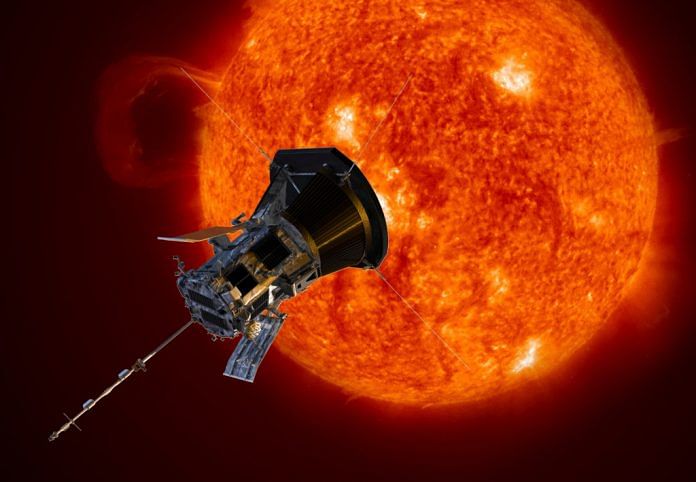Dementia patients in the US are being given unapproved drugs ‘with possibly fatal consequences’, and China’s crackdown.
NASA is taking mankind to the Sun
US space agency National Aeronautics and Space Administration (NASA) has launched a mission to send a spacecraft closer to the Sun than ever before, the BBC reported.
NASA’s Parker Solar Probe lifted off Cape Canaveral in Florida after some initial glitches, Sky News reported.
The probe will “touch the sun” and gain speeds that have never been recorded in space history, over 190 km/second, the report added. Estimates suggest that it will get within six million kilometers of the Sun.The probe will try and initiate 24 close approaches to the solar body starting November.
The probe has been named after Dr Eugene Parker, 91, who had first proposed the existence of solar winds about six decades ago. The $1.5 billion project is meant to understand the Sun, its characteristics, the solar winds and their effects on Earth.
According to reports, while such an experiment has been on the cards since 1958, the capacities to experiment in such extreme conditions and survive the excruciating effects of Sun’s atmosphere have been gained only now.
On Sunday, NASA tweeted:
The #ParkerSolarProbe is on a trajectory that will bring it closer to the Sun than any other object created by humanity. pic.twitter.com/uCjhnooVpC
— NASA's Launch Services Program (@NASA_LSP) August 12, 2018
China under lens for ‘Uighur crackdown’
A United Nations human rights panel claimed Friday it had credible reports that around 1 million Uighurs, a minority group of practising Muslims, were being held in “what resembles a massive interment camp that is shrouded in secrecy”, Reuters reported.
Uighurs live predominantly in China’s Xinjiang province.
Gay McDougall, member of the UN Committee on the Elimination of Racial Discrimination, said approximately two million Uighurs and other Muslim minorities were being forcefully confined to “political camps for indoctrination” in China’s western Xinjiang autonomous region, Reuters added.
A Chinese delegation of 50 officials did not respond to McDougall’s remarks.
Chinese authorities have asserted that the Xinjiang province faces possible threat from Islamist fundamentalists.
Mother whale has been mourning her child for two weeks
More than two weeks after a whale lost her calf hours after birth, she is still mourning the death, reports CNN.
“The mother, preventing the body from sinking to the ocean floor, has been carrying it and nudging it toward the surface of the Pacific off the coast of Canada and the northwestern US,” the report added.
Tahlequah, or J35, as the researchers call her, was last spotted Thursday afternoon, 17 days after the baby’s birth.
“It’s heartbreaking to watch… This kind of behaviour is like a period of mourning and has been seen before. What’s extraordinary about this is the length of time,” CNN quoted Michael Milstein of the US National Oceanic and Atmospheric Administration as saying.
Grieving is a common sign observed among mammals such as whales, dolphins, elephants and deer. Scientific evidence reveals that the orca brain is large, complex and highly developed in areas dealing with emotions, Lori Marino, president of the Whale Sanctuary Project told CNN.
Dementia parents in the US given unapproved anti-psychotics
Nursing homes in the US are drugging dementia patients with unapproved anti-psychotic drugs and have not controlled the practice despite being warned about the possible fatal outcomes,reports The Washington Post.
Through interviews with more than 300 people in nursing homes across the US, the reporter found that staff members “admitted” to giving anti-psychotic drugs to people with dementia, oblivious to the catastrophic consequences it could have on a patient’s health. Such drugs were administered in order to “sedate” and “control” the patients, the report added.
Trends uncovered in a 1975 report released by the US Senate, titled ‘Drugs in Nursing Homes: Misuse, High Costs, and Kickbacks’, remain prevalent 40 years later.
“Despite the warning, nursing homes still often administer anti-psychotic drugs in this manner, sometimes without seeking informed consent first, in violation of federal regulations and human rights norms,” the report added.
Citing a 5 February 2018 report issued by Humans Rights Watch, the report said an estimated 179,000 older people in nursing homes were being given anti-psychotic drugs “without an appropriate diagnosis”.
The American Psychiatric Association has said “there is consistent evidence that anti-psychotics are associated with clinically significant adverse effects, including mortality”.
‘Maldives wants to rid itself of excessive Indian influence’
Maldives’ decision to return two military helicopters provided by India for medical evacuations is being interpreted as a move to “woo China”, commentator Yu Jincui wrote in an op-ed for China’s Global Times Sunday.
According to the columnist, the Maldivian ambassador in India, Ahmed Mohamed, told Reuters Friday that “with the development of adequate infrastructure, facilities and resources”, Maldives is now in a position to handle medical evacuations on its own.
“Some Indian diplomats and security officials reportedly even claimed the Maldives government was scaling back all security and other collaborative agreements with India at the behest of China,” Yu added.
Saying New Delhi “has long regarded the South Asian island nation as its backyard and sphere of influence”, Yu added that India had a “strong desire to tighten its grip on the capital city of Malé and exclude other countries’ influence”.
The column added that “as an independent sovereign country, the island republic increasingly desires to rid itself of excessive Indian influence and maximise its interests by developing diplomatic ties with all major powers. The request for the withdrawal of the helicopters and personnel is an embodiment of such a desire and sends an important message to all major powers in the Indo-Pacific region”.
Stating that China did not attempt to interfere in others’ domestic affairs and seek a sphere of influence, Yu adds, “India’s desire to strengthen its control over the Maldives or the US Indo-Pacific strategy, is doomed to fail.”
Contributed by Sankalita Dey, Avishek Jha and Aastha Singh, journalists at ThePrint.



